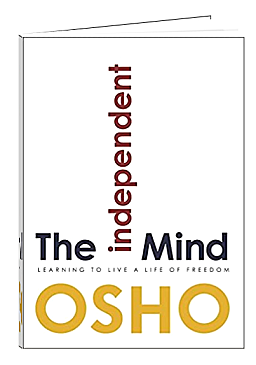The Independent Mind

The Independent Mind
Learning to Live a Life of Freedom
Book — Also available in other formats: eBook
Day in day out, everyone’s mind is full of thoughts. But where do they come from? Are they independent thoughts or are they concepts and doctrines borrowed from other people? Have they been assimilated from parents or teachers? From religious or political leaders? In this series of talks given at a meditation camp, Osho describes what “thinking” really means: the freedom to live an independent life, consciously, and with trust in one’s own experience.
“A person who accumulates thoughts will become a scholar. A person who gives birth to thinking – gives birth to the ability to think, asks questions and challenges his consciousness and then waits for the answer – in his life, knowing is born. It is not through thoughts that you attain knowing but through thinking. Not by collecting thoughts, but by giving birth to thinking.”
–Osho
Chapter Titles
#1: Discovering Life
#2: Drop Borrowed Thoughts
#3: Faith and Belief Hinder Freedom
#4: Answers Come through Consciousness
#5: The Thinking State: Your Center, Your Being, Your Soul
#6: Religiousness: Understanding Life
Details
Day in day out, everyone’s mind is full of thoughts. But where do they come from? Are they independent thoughts or are they concepts and doctrines borrowed from other people?
Excerpt from: The Independent Mind from Chapter 2
The body is utterly dependent, there is no freedom there. Is there anything within us which is beyond the body, which transcends the body? Certainly: the mind – and we get a few glimpses of it. Every man is aware that he has a mind. He can hear the footsteps of his thoughts. When in contemplation thoughts arise, he gets some indication that the mind exists.
The body is, as I said, unavoidably dependent, but the mind isn’t. The mind can become independent, but ordinarily, the mind is also dependent. At the level of the mind too there is no freedom in our life. At the level of the mind, we are also dependent. At the level of the body, desires and instincts have gripped us. At the level of mind, we are gripped by beliefs; at the level of mind, words, scriptures, doctrines have caught hold of us. The mind is also a slave. The mind walks and moves on the path of dependency; there is no freedom there.
But the mind can become independent. That is the difference between the body and the mind. The body is dependent and cannot become independent; the mind is also dependent, but it can become independent. And there is an element beyond all this which is called the soul – you can also give it other names. I will talk about it; we will work toward it. The soul is independent and it cannot be dependent. These are the three levels of life: the body which is dependent and cannot become independent; the mind which is dependent but can become independent; the soul which is independent and is incapable of becoming dependent.
Only a mind that is independent is capable of knowing the soul – which without a doubt is free and alive, which is immortal, which knows no birth and no death. If the mind is dependent, it won’t be able to know anything other than the body. A dependent mind cannot look beyond the dependent body. As long as our mind is dependent, we will feel that we are nothing other than the body. But if the mind is independent, it will raise its eyes toward the soul that is free, alive.
Therefore it is neither a question of the body nor of the soul. While meditating, the whole question is centered around the mind: are our minds independent or are they dependent? If the mind is dependent, life cannot rise beyond the body. Then life will take you to death. But if the mind is independent, then life’s eyes can begin to look toward immortality
Details
More Information
Type Compilations
Publisher OSHO Media International
ISBN-13 978-1938755798
Dimensions (size) 12.95 x 0.76 x 20.07 cm
Number of Pages 145
- Log in to post comments
- 873 views
